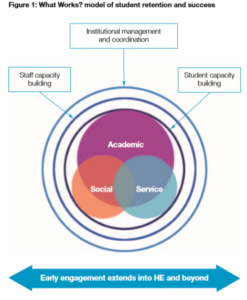Overview of Literature
Student engagement and student retention have been well documented and literature around student retention has been prevalent for many decades dating back to the sixties. The extent of research around student engagement lagged behind for many decades but since 2008 there has been a surge in interest around student engagement and during the last 5 years (2014-2018) there have been a reported 1747 articles with the words ‘student engagement’ in their titles compared to 470 with the words ‘student retention’ in their titles (Tight, 2019).
Commenting on the attention that student engagement has received over the past few decades Balwant coined it a ‘buzzword’ but continued: “… despite the popularity of student engagement, there is often little regard for the meaning of engagement…” (2018, p. 389). The increase in literature has done little to help arrive at a consensus around the meaning of student engagement though the positive impact that effective engagement can have on retaining students and their success is undisputed.
An Institutional Approach
There is much literature around student engagement that focusses around partnerships with students and pedagogic practices that help to ‘engage’ students. These provide valuable contributions to the field of student engagement and subsequent successes that students enjoy; however, taking a step back and thinking about ‘student engagement’ more holistically in the context of the whole student journey can help to promote a shared understanding and appreciation that effective student engagement requires an integrated institutional approach.
It is perhaps useful to think about student engagement in its simplest form; if our students are engaged, they participate, they actively get involved contributing to, and helping shape, their whole university student learning experience. In understanding engagement, studies have identified and categorised engagement into three different dimensions: behavioural, emotional and cognitive (Balwant, 2018; Trowler, 2010). These dimensions provide a useful framework to think about student engagement beyond the confines of a module and help us to understand how the wider university can support effective student engagement.
A Model of Student Success and Retention
What Works? Model of Student Success and Retention
- Early engagement: engagement to promote belonging must begin early and continue across the student life cycle.
- Engagement in the academic sphere: engagement and belonging can be nurtured throughout the institution (academic, social and professional services), but the academic sphere is of primary importance to ensure all students benefit.
- Developing the capacity of staff and students to engage: the capacity of students to engage and staff to offer an engaging experience must be developed, thus a partnership approach in which everyone is responsible for improving student belonging, retention and success is required.
- Institutional management and co-ordination: at the senior level the institution must take responsibility for nurturing a culture of belonging and creating the necessary infrastructure to promote student engagement, retention and success. This includes the use of data to underpin student retention and success.
Source: Thomas, L (July 2012).

The above model supports the early engagement of student through pre-entry and induction activities focussing around building relationships and engaging students with key information. This engagement must continue throughout the student journey to promote success and avoid student withdrawals. The evidence from the What Works? Programme recognised the important of student-centred learning and high-quality learning and teaching practices within the academic sphere. However, it also recognised how engagement can take place in other spheres of the institution for example: Student and Library Services, Students Union and Academic Enterprise and how these can significantly contribute to student retention and success particularly when delivered and integrated through the academic sphere rather than students accessing them autonomously. This is particularly relevant and important when students may not be on-campus.
Evidence from the What Works? Programme showed that students don’t always recognise the value of engagement. Institutions need to work with students to develop their capacity to engage effectively in their HE experiences and provide a range of opportunities to reflect the different levels of engagement that students are comfortable with. Such opportunities throughout the institution and across the student journey require all staff to be involved and this is where the institutions need to provide that commitment and support to staff to develop their capacity around promoting effective student engagement. The final component of the model relates to the senior management of the institution taking responsibility for managing and promoting student engagement to enhance engagement, belonging, retention and success.
Teesside University’s commitment to student engagement, retention and success is evidenced through its Vision, Mission and Values and explicit within many themes of its Academic Enhancement Framework (AEF). The AEF provides the structure through which Future Facing Learning, and other key strategic priorities are embedded within academic practice ensuring students are provided with the skills and knowledge to thrive in complex and uncertain futures. Teesside University’s Academic Enhancement Framework can be accessed here: https://unity3.tees.ac.uk/departments/058/SD2017/SitePages/Academic%20Enhancement%20Framework.aspx
References
Balwant, P. (2018) The meaning of student engagement and disengagement in the classroom context: lessons from organisational behaviour, Journal of Further and Higher Education, 42:3, 389-401, DOI: 10.1080/0309877X.2017.1281887
Thomas, L. (July 2012) Building student engagement and belonging in higher education at a time of change: final report from the What works? Student retention & success programme. London: Paul Hamlyn Foundation.
Tight, M. (2019): Student retention and engagement in higher education, Journal of Further and Higher Education, DOI: 10.1080/0309877X.2019.1576860
Trowler, V. (November 2010) Student engagement literature review. York: Higher Education Academy
